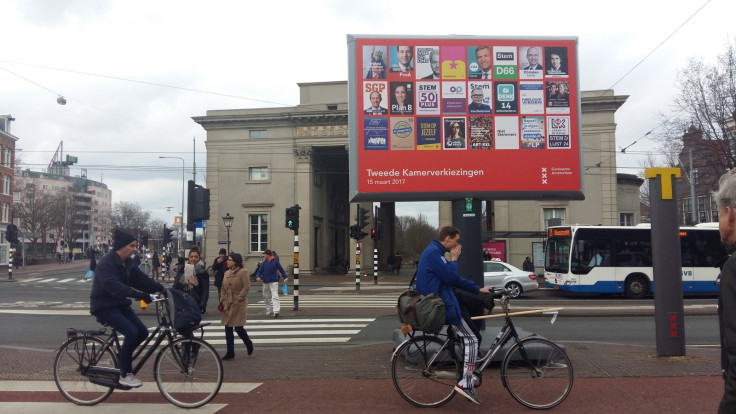The Dutch 'silent majority' finds its voice against Geert Wilders' divisive rhetoric
Rally participants know what country they want to live in, but not who to entrust with their vote on 15 March.

As the Dutch election campaign entered its final 10 days, a group of citizens eager to make their voice heard gathered in Amsterdam in a former power station.
Under the banner "We are the Netherlands", the event on Saturday (4 March) aimed to gather voices and energies to stand up to the divisive rhetoric of far right party leader Geert Wilders, and reclaim the country as belonging to everyone.
Wilders' campaign has focused on the message of reclaiming the country from immigrants, particularly those of Islamic faith. "The Netherlands ours again" and "Stop Islam" are the two main slogans donning his Freedom Party's (PVV) campaign posters.
The party leader was recently convicted of discrimination for promising to have fewer Moroccans in the country during a political rally. Despite the conviction, his party is still predicted to increase its presence in Parliament in the upcoming election on 15 March.
This, along with the rise of populism and white supremacy movements in other European countries and in the US, worries the so-called "silent majority" of Dutch people, who see their idea of community ("samenleven" in Dutch, literally meaning "living together") under threat.
"People think a line has been crossed," Wouter Booij, one of the event organiser, told IBTimes UK. Booij also organised a rally in The Hague last month that gathered around 3,000 people to protest Donald Trump's travel ban on citizens of seven Muslim-majority nations, calling the demonstration "Holland against hate". He said at the time: "It was a wake-up call. We have a progressive majority in this country that was silent for a while but now they see they need to stand up."
The silent majority in The Netherlands speaks out against racism & division in Dutch society #wijzijnNL pic.twitter.com/yEnI0GUHUU
— Isabelle Gerretsen (@izzygerretsen) March 4, 2017
A few hundred people attended the event on Saturday. The meeting revolved around two-minute speeches delivered by fellow citizens, expressing their ideals of equality, freedom and unity in the face of division and discrimination. The speeches were punctuated by performances of Dutch artists, around the same themes. Yet the audience itself seemed to lack that diversity as most of the people taking part in the event where middle-aged white people, mostly members of the Dutch Labour party PvdA.
While the event had ostensibly no political banner, red scarves and hoodies bearing the party's logo were easy to spot among the audience. PvdA party leader and deputy Prime Minister Lodewijk Asscher promoted and briefly attended the event, delivering a short speech.
Toespraak van Lodewijk Asscher @LodewijkA bij de kickoff van @Wij_zijn_NL #WijzijnNL pic.twitter.com/OnyNAF4nJS
— Hans van der Graaff (@HansvdGraaff) March 4, 2017
"Most Dutch people want to live with each other in freedom. No one wants to live in a divided country. No one wants to be a scapegoat, the enemy, the outsider. No one wants to be born into a box which you can only get out of by fighting. Everyone wants to have the right to be themselves, that their dreams can be achieved without racism, sexism and discrimination limiting you. That is what we fight for," he said.
Echoing murdered British MP Jo Cox's message of unity, he added: "I don't want to stand on the sidelines when people translate fear and angry political headlines into seats. I wish to be here for all those Dutch citizens who believe that we have more in common than that which divides us. I am so proud that so many different people stand on this platform to fight for the Netherlands we love. There is only one future, message and path: the Netherlands belongs to us all and we are the Netherlands."
His speech was welcomed by a loud applause, even staunch party supporters doubt whether they can rally behind Asscher in the election, leaving the pool of voters who want to oppose Wilders' message without a clearly defined political home. Many in the audience told IBTimes UK they had not yet decided who to vote for. One audience member and a long-time PvdA voter said he was not sure about voting the party, as he found Asscher "a bit slimy".
Another audience member who came to the Netherlands from Jamaica 32 years, and one of the few people in the audience who was not born a Dutch citizen but became one, echoed that feeling of uncertainty. "Usually I vote for PvdA," she said "But now I am not too sure about which way they are going and if they are really representing me and a lot of other people."
© Copyright IBTimes 2025. All rights reserved.






















